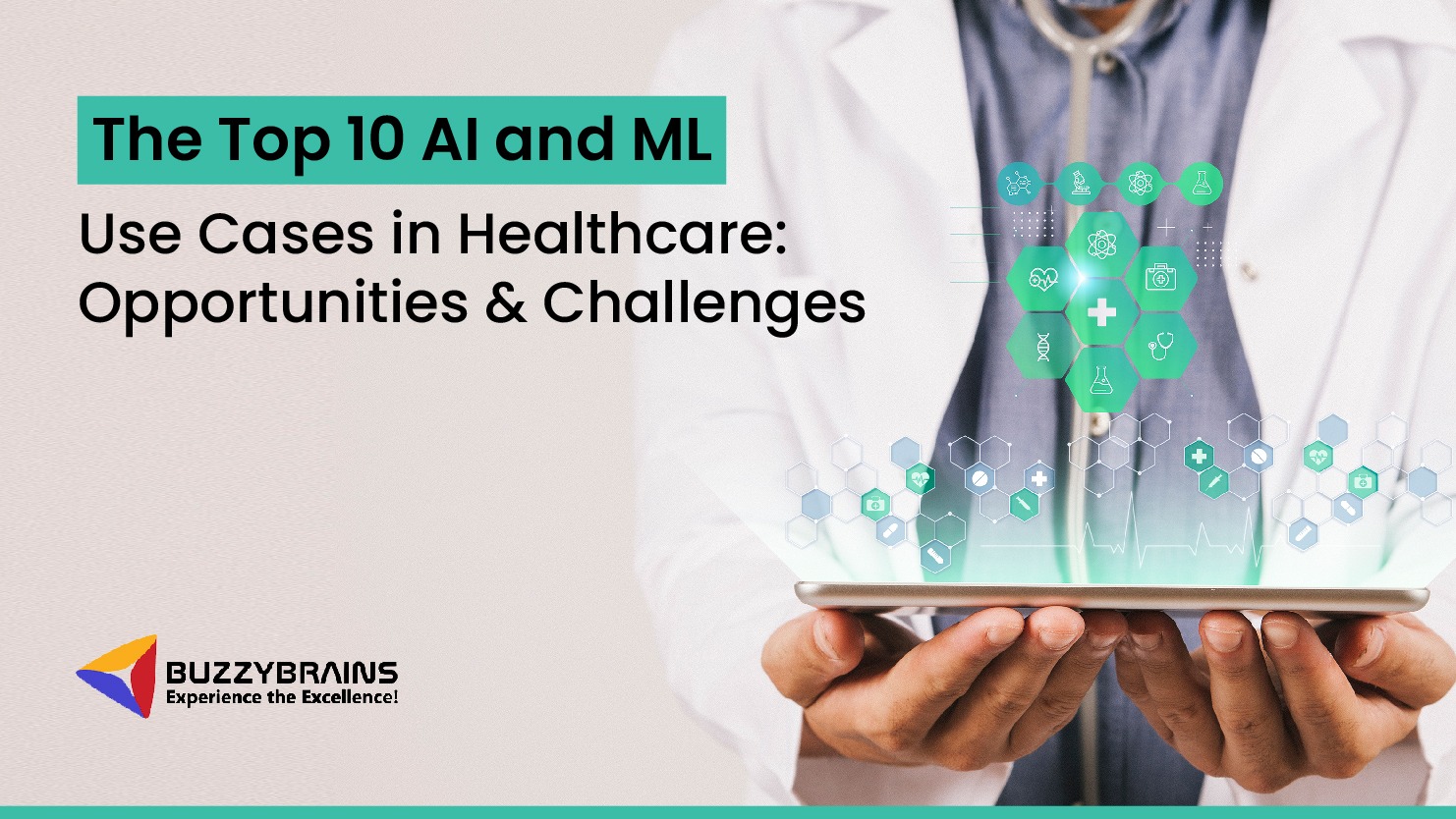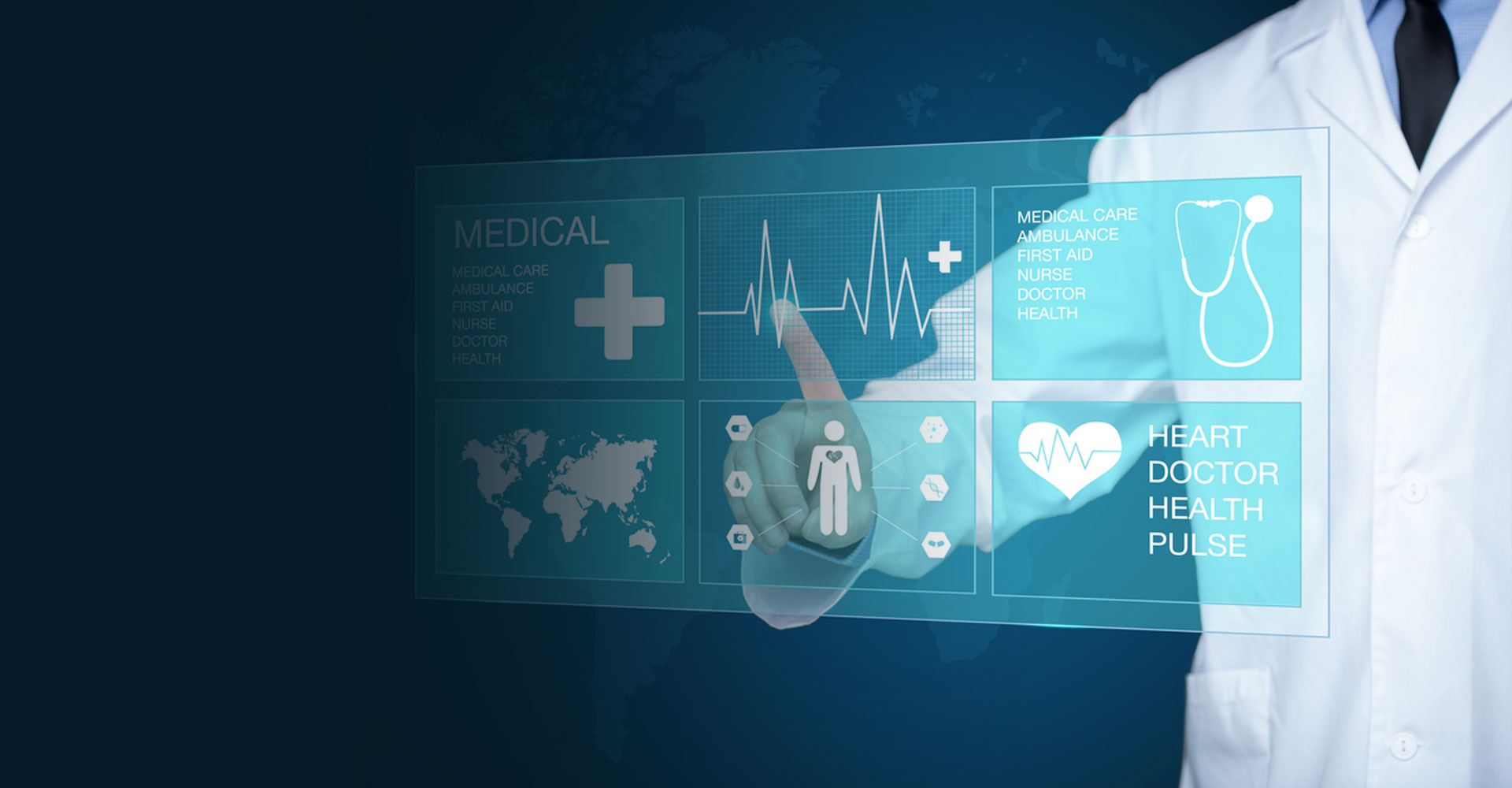The Top 10 AI and ML Use Cases in Healthcare: Opportunities and Challenges

What are AI and ML?
Artificial Intelligence (AI) and Machine Learning (ML) are interrelated but distinct phenomena. Owing to their close-knit connection, when you look into the AI-ML duo, you are looking at an interconnection. To begin with, artificial intelligence is the capacity of a computer system to emulate human cognitive functions, such as learning and problem-solving. Through AI, a computer system uses mathematics and logic to stimulate the reasoning that people use to understand novel information and make informed decisions.
On the contrary, machine learning is an application of AI. We can understand ML as the mechanism of using mathematical models of data to assist a computer in learning without direct human intervention and instruction. Thus, the computer can continue its learning and work on improving on its own accord, based on experience.
In today’s day and age, AI and ML have integral parts of almost all sectors and industries, such as technology, health, finance, and more. When we specifically focus on healthcare and AI-ML, the duo has phenomenal benefits. For instance, machine learning algorithms can quickly and seamlessly process large amounts of clinical documents, identify patterns, and make predictions about medical outcomes with state-of-the-art accuracy. Similarly, by co-opting AI technologies for tasks like disease diagnosis and drug discovery, healthcare professionals are better equipped to accurately diagnose diseases and customize treatments to individual patients’ requirements.
The Top 10 AI and ML Use Cases in Healthcare
AI and ML have massive and expansive roles within the healthcare arena. The global market of AI and ML in healthcare is expected to cross the USD 8 billion milestone by 2026. The AI-ML duo offers numerous advantages compared to traditional analytics and clinical decision-making approaches. The ten major ML and AI use cases in healthcare are –
1. Accurate Cancer Diagnosis
Nowadays, there are ML and AI tools in healthcare that enable pathologists to make accurate and precise diagnoses. For instance, by reducing errors during the process of cancer diagnosis and offering novel techniques for individual medical treatment, the AI-ML duo increases accuracy in cancer diagnosis and bolsters the prospect of saving a patient’s life.
2. Customer Service Chatbots
AI and ML-based chatbots enable patients to raise queries regarding appointments, bill payments, and more. Besides, chatbots can also communicate with patient’s vis-a-vis their illnesses, symptoms, and more. The culmination is that the burden on the medical expert is mitigated considerably. Furthermore, chatbots can also offer basic and preemptive solutions to patients, and help the healthcare professional to focus on more pressing duties.
3. Early Diagnosis of Fatal Blood Diseases
The third most important use case of AI and ML in healthcare pertains to the early diagnosis of fatal blood diseases. Artificial intelligence has proven to be of phenomenal help when it comes to diagnosing possibly fatal blood-related diseases at an early phase.
With the assistance of ML and AI-infused microscopes, doctors are now able to scan for harmful elements and bacteria in samples of blood, such as E. Coli, and more. The process is much faster than manual scanning and comes with an excellent accuracy of 95 percent. Thus, the possibility of wrong treatment and fatality reduces by a large margin.
4. Treating Rare Diseases
Nowadays, certain AI and ML-based biotech platforms, such as BERG, are coming up with futuristic technologies that map diseases to accelerate the process of finding and creating breakthrough medicines and vaccines. For instance, BERG has also presented its discovery for the treatment of Parkinson’s disease.
5. Targeted Treatment
The fifth use case of AI and ML in healthcare revolves around targeted treatment. With the help of technologies, such as Deep Learning it is possible to provide the right treatment to the required patients at the right time. Thus, the culmination is an improved target selection of patients. A company known as Benevolent AI is leveraging Deep Learning and AI to provide targeted treatment and create portable medication for rare diseases.
6. Automation of Redundant Healthcare Responsibilities
Another major use case of AI and ML is that it automates the redundant, laborious, and time-consuming tasks in healthcare. Nowadays, several AI and ML-based tools are available that automate tasks, such as checking the eligibility of unadjudicated medical claims, transferring the required medical data to the right medical professionals, and so on. Thus, the administrative department is free to focus on more intellectual, humane, and pressing duties.
7. Reduction in Dosage Errors
When it comes to the healthcare sector, there is no room for mistakes. However, human errors are a necessary evil. It is quite common to hear some medical professional somewhere giving the wrong dosage or medication to the patient. Such mistakes have many costly repercussions, some of which may even culminate in death. However, with the help of ML and AI, it is possible to reduce the margin of probable errors in dosage and medication and offer improved and more efficient care to all.
8. Robot-assisted Surgery
In recent times, robot-assisted surgery has gained a lot of traction. Several hospitals are opting for robots that assist them in completing duties that mandate precision, control, and flexibility. For instance, robots are used in open-heart surgeries. It’s worth mentioning that surgeries assisted by AI-powered robots lead to reduced complications, decreased patient pain, and faster recovery rates.
9. Fraud Detection
The penultimate use case of AI and ML in healthcare pertains to fraud detection. Indeed, there is a growing number of patients seeking cost-effective medical services, but at the same time, there has been a significant increase in fraud cases within the healthcare industry. AI-based tools and technologies can help detect and reduce fraud cases.
10. Development of New Medicines
Last but not least, AI and ML can also be used in the development of new medicines. Coming up with new drugs for clinical trials takes a lot of time and money. However, in such a context, AI and ML technologies come to the rescue. AI enables healthcare professionals to scan pre-existing medicines and use them to redesign the medication in a way that enables them to fight against specific diseases.
Challenges of Implementing AI and ML in Healthcare
Despite their expansive potential and scope, AI and ML in healthcare are not free of challenges. What are they? Let us find out!
- Lack of Quality Medical Data – The availability of high-quality medical data is essential for clinicians to effectively validate AI models from both clinical and technical perspectives. However, owing to the fragmentation of medical data across multiple channels like EHRs and other software, collecting patient information and images to examine AI algorithms has become challenging.
- Clinically Redundant Performance Metrics – The second major challenge is that an AI model’s measure of success is not directly transferable to a clinical context.
- Methodological Research Flaws – Last but not least, there is a lack of established methodologies, research, and peer-reviewed studies of AI and ML healthcare. To understand the true value of ML and AI-based diagnosis in the real world, physicians must gauge current patients over time.
Future Opportunities that AI and ML Offers in Healthcare
The future opportunities that AI and ML offer to the healthcare sector are expansive and exciting. From diagnostics to symptom prediction and drug discovery, the scope of AI and ML in healthcare is near-expansive. The duo can be a boon for humans and healthcare organizations. The hour’s need is to invest in further research and development and establish the right infrastructure so that healthcare institutions can carry forward AI and ML implementation for patient welfare and the overall enhancement of the healthcare system.
FAQs about AI and ML Use Cases in Healthcare
Q1. What are the ethical considerations for using AI and ML in healthcare?
The ethical considerations of using AI and ML in healthcare are –
- Safety and transparency
- Informed onsent to using data
- Algorithm fairness and biases
- Data privacy
Q2. What are some examples of AI-powered medical devices?
Some examples of AI-powered medical devices are LINUS Health, Benevolent AI, Buoy Health, and more.
Q3. What are the regulatory considerations for using AI and ML in healthcare?
The regulatory considerations for using AI and ML in healthcare include governance of autonomous intelligence systems, responsibility and accountability for the systems, and privacy and safety issues.
Q4. How can healthcare providers evaluate the effectiveness of AI and ML solutions?
Healthcare providers can evaluate the effectiveness of AI and ML solutions by setting up certain criteria and benchmarks, like the accuracy of dosage, preemptive patient diagnosis, streamlining of operations, cost reduction, and more.
Q5. What are some potential risks associated with the use of AI and ML in healthcare?
Some potential risks linked with the use of AI and ML in healthcare are –
- Potential errors and patient harm
- Risk of bias and increased health inequalities
- Absence of transparency
- Susceptibility to hacking
Conclusion
So, there we have it, a crisp overview of the top ten use cases of AI and ML in healthcare. The AI and ML duo have phenomenal scope in the world of healthcare. From preventing cancer to diagnosing life-threatening diseases of the blood, AI and ML are transformative tools within the arsenal of contemporary healthcare technologies. Now is the time to leverage them and be a beacon of change.
Contact BuzzyBrains for AI and ML Services for Healthcare
Are you ready to hop onto the AI and ML bandwagon? If yes, then look no further than BuzzyBrains. We specialize in AL and ML pertaining to the healthcare industry and we help you create tools that streamline your institution’s operations. From concept to launch, our team delivers cutting-edge solutions that engage users and drive success. Don’t wait any longer, reach out to us today!
